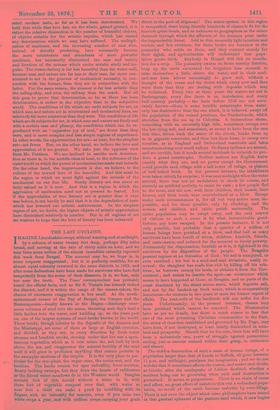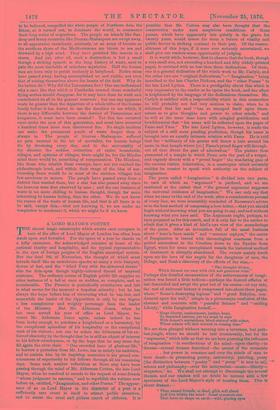THE LAST CYCLONE.
MAGINE Lincolnshire swept, without warning and at midnight, by a column of water twenty feet deep, perhaps fifty miles broad, and moving at the rate of thirty miles an hour, and we may form some notion of the almoat incredible calamity reported this week from Bengal. The account may be, we hope is, in some respects exaggerated ; but it is perfectly credible, for an almost equal calamity occurred in the same districts in 1822, and after some deductions have been made for survivors who have fled temporarily from the scene of their disasters, it is, we fear, only too near the truth. The Times' correspondent has probably heard the official facts, and as Sir It. Temple has himself visited the district, and it is within the range of the census-takers, the chance of enormous exaggeration is but small. At the north- easternmost corner of the Bay of Bengal, the Ganges and the Brahmapoetra—locally known as the Megna—discharge enor- mous volumes of mud into the ocean, thrusting each day's load a little farther into the water, and building up, as the years peas on, one of the largest systems of mud-banks known in the world. These banks, though inferior to the deposits of the Amazon and the Mississippi, are some of them as large as English counties, and divided, as they are, in every direction by fresh-water streams and brackish creeks, develop under that hot sun a spon- taneous vegetation which as it rota raises the soil inch by inch above the sea, and exaggerates the natural fertility of the mud until it will grow in profusion anything that nature permits in the swampier sections of the tropics. It is the very place in par- ticular for the rice-plant, the sugar-cane, the cocoa-nut, and the bamboo. The banks remain for ages unhealthy, fever-smitten, dreary-looking swamps, but they draw the hearts of cultivators as the fairest water-meadows do in the Western world. Imagine seventy feet of rich mould without a stone in it, with three feet of vegetable compost over that, with water so near that a child can make a pond by scrabbing with its fingers, with no necessity for manure, even if you raise two white crops a year, and with endless rivers carrying your grain
direct to the port of shipment! The water-system in this region is unequalled, there being literally hundreds of channels fit for the heaviest grain-boats, and as unknown to geographers as the minor channels through which the affluents of the Amazon pour under the impenetrable forest. Add to this, unusually light taxation and rentals, and few evictions, for these banks are fortunes to the peasantry who settle on them, and they contend sternly for their rights, and agriculturists will understand that popu- lation grows thick. Anybody in Bengal will risk an inunda- tion for a crop. The peasantry swarm on these marshy districts, heap up the earth excavated for irrigation into mounds to raise themselves a little above the water, and in their mud- and-mat huts labour unceasingly to grow rich, without a thought of the ocean and the rivers which every now and then warn them that they are dealing with deposits which may be reclaimed. Every two or three years the waters are out in Backergunge, every five there is an inundation, and every half-century probably — the facts before 1756 are not accu- rately known—there is some terrible catastrophe from water, only less destructive than the one which, it is believed, swept off the population of the ruined province, the Sunderbunds, which stretches from the sea up to Calcutta. A tremendous storm, coinciding with an unusually high tide, sometimes sweeps over the low-lying soil, and sometimes, as seems to have been the case this time, drives back the water of the rivers, banks them up as in gigantic reservoirs, and then lets them loose, to sweep over counties, as in England and Switzerland reservoirs and lakes sometimes sweep over small valleys. Ordinary cyclones are annual, and are terrible, but it needs several incidents to coincide to pro- duce a grand catastrophe. Neither natives nor English know exactly what they are, and no power except the Government could provide each village with a tall tower of refuge, or plateau of half-baked brick. In the present instance, the inhabitants were taken utterly by surprise ; it was near midnight when the water arrived, there was not an undulation to check its course, and scarcely an artificial acclivity to resist its rush ; a few people fled to the trees, and the rest, with their children, their beasts, their houses, and their tools, were overwhelmed at a blow. Escape under such circumstances is, for all but very active men, im- possible, and for them possible only by climbing, and the women and children and cattle perish unitersally. The entire population may be swept away, and the only marvel of visitors to such a scene is by what inconceivable good- fortune any have escaped. In the present instance, it is not only possible, but probable that a quarter of a million of human beings have perished at a blow, and that half as many survivors have been bereft of wives, children, kinsfolk, friends, and caste-mates, and reduced for the moment to lonely poverty. Fortunately the dispensation, horrible as it is, is lightened to the survivors by the disposition of the people. The Bengalee peasant repines at no visitation of God ; his soil is uninjured, or even enriched ; his hut is a mud-and-mat structure, easily re- newed ; the slaughter has made him rich by killing off his rela- tives; he borrows money for tools, or obtains it from the Gov- ernment; and unless he deserts the spot—an occurrence will& seems to have happened at Gour, at Bengala, and on parts of the coast desolated by the direct storm-wave, which deposits salt, and not by the banked-up fresh water, which is comparatively innocuous—he restores in two years at most the former aspect of affairs. The rent-rolls of the landlords will not suffer for five years. Unfortunately, in the present instance, classes may have perished which cannot be renewed. The Missionaries have as yet no details, but there is much reason to fear that one of the most promising Christian communities in the East, the series of churches established and governed by Mr. Page, may have been, if not destroyed, at least fatally diminished in num- bers and prosperity. Should that be the case, their fate will have been a melancholy one, years of struggle against persecution ending, just as success seemed within their grasp, in extinction and silence.
The sudden destruction of such a mass of human beings, of a population larger than that of Leeds or Suffolk, all gone between 11 p.m. and midnight, paralyses the imagination ; and we do not wonder that it sometimes affects the reason, and makes men doubt, as Goethe after the earthquake of Lisbon doubted, whether a sentient being can be governing when each mad destruction is permitted. It seems so purposeless. There is no chain of cause and effect, no great effort of nature to thin out a redundant popu- lation, no revolt of the earth become unfertile by over-tillage. There is not even the object which some philosophers have traced in that gradual upheaval of the pasture-land which, it now begins to be believed, compelled the white people of Northern Asia, the fittest, as it turned out, to dominate the world, to commence their long series of migrations. The people on islands like Sun- deep and fenny countries like Deccan-Shabazpore are swept away, to all appearance causelessly, aimlessly, as an army of locusts on the southern shore of the Mediterranean are blown to sea and drowned by a high wind. They have perished like insects in a storm. And yet, after all, such a destruction is but a small though a striking episode in the long history of waste, next to pain the most insoluble of mundane mysteries. Half the human race are born only to perish uselessly in babyhood. Entire races have passed away, having accomplished no end visible, not even that of raising themselves above the beasts of the field. Why do the babies die ? Why did the Tasmanians live? One can understand why a race like that which in Cambodia erected those wonderful flying-arches should disappear, for it may have done its work and contributed its all to the general reservoir ; but can any apparent waste be greater than the departure of a whole tribe of the human family before it has learnt to use the faculties to use which, if there is any differentia between the destiny of Tasmanians and kangaroos, it must have been created ? Yet this has occurred once under the eyes of this generation, and must have occurred a hundred times since men discovered fire. No single incident can make the permanent puzzle of waste deeper than it always is. The people of Deccan - Shabazpore suffered no pain unusual in the lot of mortality, for human beings die by drowning every day, and in the universality of the disaster, the sudden extinction of entire households, villages, and systems of villages, there might be, for the Hindoo mind there would be, something of compensation. The Hindoos, like those who inhabit these swamps, have not yet reached the philanthropic level, and within their range of the idea of sur- vivorship there would be in most of the stricken villages but few survivors to mourn. The people have passed away from a district that wanted them, but a star has also passed away since the heavens were first observed by man ; and the one instance of waste is no more chilling to human thought, though far more interesting to human feeling, than the other. We do not know the reason of the waste of human life, and that is all there is to be said, except this,—that not knowing it, we are under no temptation to accelerate it, which we might be if we knew.







































 Previous page
Previous page